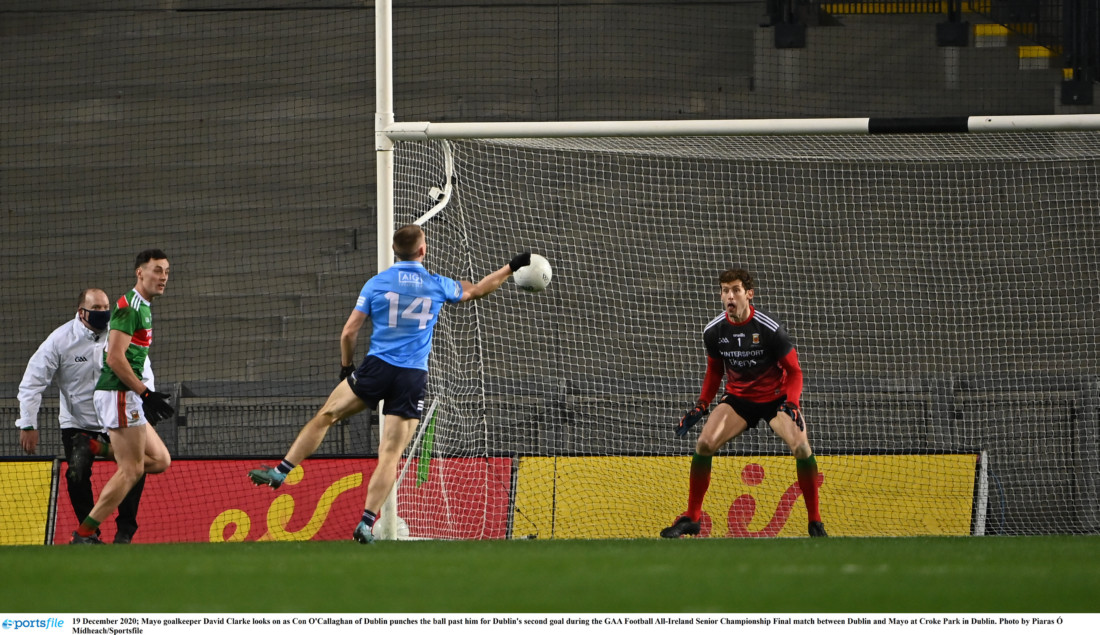I’m old enough to remember a time when nobody wanted to be a goalkeeper.
We had arguments over who should be stuck between the sticksjumpers on the grass while the rest of us got to play football.
Thanks to players like Stephen Cluxton and Niall Morgan, the position of goalkeeper has been elevated from ‘he’s useless everywhere else’ to gamechanger.
For so long, little thought was given to it as a position, and it’s a place where teams can reap reward if their ‘keeper is both physically and psychologically agile.
It’s probably one of the most psychologically draining jobs on the pitch. They’re isolated, for a start. Their mistakes are magnified. One can be catastrophic and those of us in the stands fail to see the numerous outfield errors that occurred leading up to a goal. We choose to see a fumble, or a bad position.
We can all picture howlers from the past in our mind’s eye. A ball hits the net, one team rejoices, the other wilts while the goalkeeper is just supposed to pick it up and restart, all while staying in control.
Everyone makes mistakes in football and hurling. In every sport. No performance is perfect. However, a goalkeeper’s mistake is highlighted in a bright yellow marker and action replays.
How a player psychologically deals with those mistakes will be the difference between being a good ‘keeper, and a great ‘keeper.
Would you be able to do it? In the heat of an Ulster final or an All-Ireland final, knowing that the restart post-disaster could potentially dictate the outcome of the game more than several mistakes further out the field?
It requires a sophisticated process of mental recovery to be able to do that within seconds.
Mental and psychological skills training are key. A bad restart, from a shaky kickout can further shock and spook your teammates, and can kill your confidence as a ‘keeper.
You’ve opened to door to the opposition. They smell blood. A few mistakes could potentially have you benched, a lot quicker than your outfield teammates.
Coaches and managers need to know how this will affect a ‘keeper’s mentality. Some will welcome the chance to refocus on their skills and build.
The vast majority end up with their hearts in their boots and will take months to recover, but had they had a bit of arm-around-the-shoulders treatment, might have be more prepared to get back on the horse, motivated to try again.
Goalkeepers are a precious commodity in Gaelic games and should be treated as such.
The best thing you could do for your ‘keeper as a manager, is to take the time to imagine yourself in their shoes.
Give them the opportunity to explain their thoughts and why they thought certain incidents evolved. Build on that rapport to tailor a plan to finesse their skills.
Don’t forget the person in the number 16 jersey. Historically, they get the least playing time, and rarely make an appearance unless there has been a disaster like injury or a red card.
Who can forget, during one of the many brilliant All-Ireland finals between Mayo and Dublin when Rob Hennelly was sent off the field, and poor David Clarke had to step into the breach, cold, for a penalty?
Examples like this is why I’m continually amazed by the lack of time given to the psychological welfare of goalkeepers. They regularly shoulder inordinate responsibility for their team. It can nearly be an individual sport within a team game at times.
It makes perfect sense that they be singled out for extra supports, which they often don’t get.
A good setup will arrange access to a sport psychologist to work on individualised plans.
Things like positive self-talk, imagery, pre-performance routines, focus, confident decision-making and emotional control. Things that are easily said but take time to learn. They’re the skills that develop an aura that is hard to permeate and give reassurance to 14 other players and the side-line.
From junior championship to intercounty, the days of expecting a ‘keeper to just show up and perform, with all the additional demands placed upon them by the evolving tactics of the game should be numbered.
To send them out ill-prepared is cruel and jeopardises the overall success of your season. They have no hiding place.
A goalkeeping coach is an excellent start. Add in the expertise of a sport psychologist and you are giving your Number One all the tools they need to manage the game.
That supreme confidence to physically put their bodies on the line, while coping with all the mental demands placed upon them is what makes the greats great.
Their job isn’t to stop goals. That’s a by-product of their original goal, excuse the pun. Their job is to cope with pressure.
Receive quality journalism wherever you are, on any device. Keep up to date from the comfort of your own home with a digital subscription.
Any time | Any place | Anywhere












